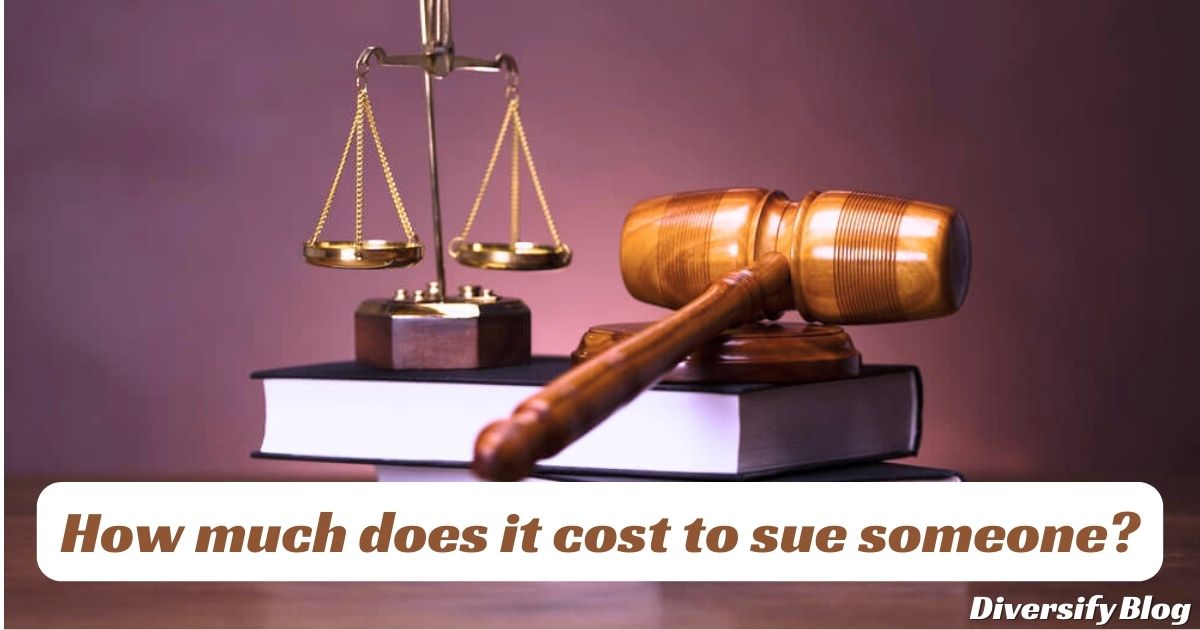Introduction:
“How much does it cost to sue someone?” This question weighs heavily on the minds of individuals considering legal action after an injury or accident. In Ohio, where personal injury cases abound, understanding the financial implications of pursuing compensation is crucial. Fortunately, the legal landscape offers a ray of hope through contingency fee structures, ensuring that individuals can seek justice without bearing the burden of upfront expenses. However, navigating the complexities of legal fees, settlement negotiations, and statutes of limitations requires careful consideration and expert guidance.
In this article, we delve into the intricacies of the cost of suing someone, shedding light on the contingency fee model, key considerations when hiring a lawyer, the settlement versus trial dilemma, and the significance of Ohio’s statutes of limitations. Armed with this knowledge, individuals can approach their legal journey with confidence, knowing they have the tools to protect their rights and seek fair compensation for their injuries.
Table of Contents
No Upfront Costs for Injury Cases in Ohio:
If you’re thinking about suing someone for a personal injury in Ohio, you should know that it usually won’t cost you anything upfront.
Most personal injury lawyers work on a contingency fee basis. This means you don’t pay them any money out of your pocket. Instead, the lawyer only gets paid if they win your case and get money for you.
Here’s how it works: If your lawyer wins your case, their fees will come from the money they recover for you. So, you don’t need to pay the lawyer from your own savings.
If your lawyer doesn’t win, you don’t owe them any attorney’s fees. This means you can get legal help without worrying about paying upfront.
In short, if you’re hurt in Ohio and want to sue, you won’t have to pay anything upfront to your personal injury lawyer. This lets you focus on getting better while your lawyer handles the legal stuff.
How Contingency Fees Work:
Contingency fees are a payment arrangement used by personal injury lawyers that make it easier for clients to get legal help without paying upfront. Here’s a simple explanation of how they work:No Retainer FeesUnlike other types of lawyers, personal injury lawyers usually don’t ask for a retainer. A retainer is money you pay upfront for legal services. For example, if you hire a lawyer for a divorce, they might ask for money upfront to cover their initial costs. You keep paying them as they work on your case.Payment After WinningWith a contingency fee, you only pay your lawyer if they win your case. The lawyer’s fee is a percentage of the money they recover for you. This percentage will be discussed and agreed upon before you sign a contract with them.Different PercentagesThe percentage your lawyer takes can vary. There might be one percentage if your case settles out of court and another if it goes to trial. Your lawyer will explain these details before you agree to anything.No Win, No FeeIf your lawyer doesn’t win your case, you don’t owe them any attorney’s fees. This means you don’t risk losing money if your case isn’t successful.In summary, contingency fees make it easier to get legal help because you don’t pay anything upfront, and you only pay your lawyer if they win your case. This arrangement helps ensure that everyone has access to legal representation.
When you’re looking for a lawyer to handle your case, it’s important to understand how their fees work. Here’s what you need to know:
Free Consultations
Many law firms offer free consultations to potential clients. This is a chance for you to meet with the lawyer and discuss your case without having to pay anything. During this meeting, you can ask questions and get a better understanding of how the firm operates.
Key Questions to Ask
During your consultation, there are several important questions you should ask:
- What are my rights based on the facts of my case?
- What legal options do I have to pursue compensation?
- Are there any potential issues with my claim?
- What is the timeline for my case, and how do Ohio’s statutes of limitations apply?
- What services does the firm offer, and what is their fee structure?
Fee Structure
It’s crucial to understand how the law firm charges for their services. They will typically explain their fee structure and the percentage of your recovery that they will take as their fee. This information will help you make an informed decision about whether to hire them.
No Out-of-Pocket Costs
One of the advantages of working with a personal injury lawyer is that you generally won’t have to pay any out-of-pocket costs. If the lawyers don’t win your case, you won’t owe them any money.
In conclusion, it’s important to take advantage of free consultations to learn about a law firm’s services and fee structure. Understanding these details will help you choose the right lawyer for your case without any financial risk.
Do You Need an Attorney?
Deciding whether to hire a personal injury attorney can be a big decision. Here are some things to consider:

Pros of Hiring an Attorney
- Legal Expertise: Lawyers have the knowledge and experience to navigate the legal process and fight for your rights.
- Case Management: An attorney will handle all aspects of your case, from paperwork to negotiations with insurance companies, allowing you to focus on your recovery.
- Resource Allocation: Law firms have the financial resources to investigate your case thoroughly and hire experts if needed.
- Maximizing Compensation: Attorneys know how to value your claim properly, ensuring that you receive fair compensation for your injuries and losses.
Cons of Representing Yourself
- Lack of Legal Knowledge: Without legal training, it can be challenging to understand the complexities of the legal system and advocate effectively for yourself.
- Limited Resources: You may not have the financial resources to hire experts or cover litigation costs, putting you at a disadvantage.
- Risk of Undervaluing Your Claim: Without legal guidance, you may settle for less compensation than you deserve, leaving you with insufficient funds to cover your expenses.
Free Consultations
Even if you’re unsure whether to hire an attorney, most law firms offer free consultations. During this meeting, you can discuss your case with the attorney and get a better understanding of their services and how they can help you. There’s no obligation to hire the attorney after the consultation, so it’s worth taking advantage of this opportunity to explore your options.
In summary, while you’re not legally required to hire an attorney for your personal injury case, it’s often beneficial to have professional legal representation on your side. A lawyer can protect your rights, navigate the complexities of the legal system, and help you secure the compensation you deserve.
Most Cases Settle Without Trial
In the legal world, most personal injury cases are resolved through settlement negotiations rather than going to trial. Here’s what you need to know:
Settlement Process
- Negotiations: After filing a lawsuit, both parties engage in negotiations to reach a settlement agreement. This involves exchanging offers and counteroffers until a resolution is reached.
- Mediation: In some cases, the parties may participate in mediation, where a neutral third party helps facilitate negotiations and find common ground.
- Settlement Agreement: If an agreement is reached, the terms are documented in a settlement agreement, which is signed by both parties.
Benefits of Settlement
- Faster Resolution: Settling a case avoids the time and expense of going to trial, allowing you to receive compensation more quickly.
- Control Over Outcome: In a settlement, both parties have more control over the outcome compared to leaving the decision in the hands of a judge or jury.
- Reduced Stress: Avoiding trial can alleviate the stress and uncertainty associated with litigation, allowing you to move on with your life sooner.
Risks of Going to Trial
- Uncertain Outcome: There’s always a risk that a jury may rule against you, resulting in no compensation or a lower award than you would have received through settlement.
- Increased Costs: Litigating a case through trial can be expensive, with costs for expert witnesses, court fees, and attorney fees adding up quickly.
- Lengthy Process: Trials can be lengthy and time-consuming, prolonging the resolution of your case and delaying your receipt of compensation.
Seeking Legal Advice
While many cases settle out of court, it’s essential to have an experienced attorney on your side to negotiate on your behalf and ensure that any settlement offer adequately compensates you for your injuries and losses. A lawyer can also advise you on whether a settlement offer is fair or if it’s in your best interest to proceed to trial.
In conclusion, while most personal injury cases settle without going to trial, it’s crucial to have legal representation to advocate for your rights and ensure that you receive fair compensation for your injuries. An attorney can help you navigate the settlement process and make informed decisions about how to proceed with your case.
Ohio Statutes of Limitations:
In Ohio, there are specific deadlines, known as statutes of limitations, that dictate how long you have to file a lawsuit after an injury or wrongful death. Here’s what you need to know:
Personal Injury Cases
- Deadline: Generally, you have two years from the date of the accident to file a personal injury lawsuit under Ohio Revised Code § 2305.10.
- Importance of Timing: It’s crucial to act promptly and not wait until the last minute to pursue legal action. Failing to file within the statute of limitations could result in your case being dismissed, and you may lose the right to seek compensation.
Wrongful Death Cases
- Deadline: For wrongful death cases, the statute of limitations is also two years, but it starts from the date of death under Ohio Revised Code § 2125.02.
- Timely Action: If you’ve lost a loved one due to someone else’s negligence or misconduct, it’s essential to consult with an attorney as soon as possible to ensure that your rights are protected.
Shorter Deadlines
- Special Circumstances: Some cases may have shorter deadlines, depending on the circumstances. It’s essential to discuss the specifics of your case with an attorney to understand the applicable statute of limitations.
- Legal Advice: Consulting with a personal injury lawyer can help you understand the deadline that applies to your case and ensure that you take timely action to protect your rights.
Importance of Legal Guidance Understanding the statutes of limitations is crucial for protecting your legal rights and ensuring that you don’t miss the opportunity to pursue compensation for your injuries or losses. An experienced personal injury attorney can help you navigate these deadlines and ensure that you meet all necessary filing requirements.
In summary, if you’ve been injured or lost a loved one due to someone else’s negligence, it’s essential to be aware of Ohio’s statutes of limitations and take timely action to protect your legal rights. Consulting with a lawyer can help you understand your options and ensure that you meet all necessary deadlines to pursue your case.
Conclusion:
Understanding the costs associated with legal action is essential for anyone considering a lawsuit. With a contingency fee structure, individuals pursuing personal injury cases in Ohio can rest assured that they won’t face upfront expenses. Free consultations offered by law firms provide an opportunity to discuss the specifics of your case, including fee structures and legal options. Moreover, knowing the benefits of legal representation, such as expert guidance and case management, can help individuals make informed decisions about pursuing compensation for their injuries.
Navigating the legal process, whether through settlement negotiations or trial, requires careful consideration of Ohio’s statutes of limitations and the expertise of a personal injury attorney. By understanding these factors and seeking timely legal advice, individuals can protect their rights and maximize their chances of securing fair compensation for their losses. Consulting with a lawyer ensures that individuals have the support and guidance they need to navigate the complexities of the legal system and achieve a favorable outcome for their case.
Peoples Also Asked:
- How much does it cost to hire a lawyer in the USA?
- The cost of hiring a lawyer in the USA can vary significantly depending on factors such as the complexity of the case, the lawyer’s experience and expertise, and the location. Hourly rates for attorneys can range from $100 to $1,000 or more, with some lawyers also offering flat fees or contingency fee arrangements.
- How much is it to sue someone in South Africa?
- The cost of suing someone in South Africa can also vary depending on factors such as the nature of the case, the legal fees charged by the lawyer, and any court fees or other expenses associated with the lawsuit. It’s advisable to consult with a South African attorney to get a better understanding of the potential costs involved.
- How much does it cost to sue someone in Canada?
- Similar to the USA and South Africa, the cost of suing someone in Canada can vary depending on factors such as the complexity of the case, the lawyer’s fees, and any court costs involved. Canadian lawyers typically charge hourly rates or offer contingency fee arrangements for personal injury cases.
- What happens if you lose a lawsuit and can’t pay Canada?
- If you lose a lawsuit in Canada and are unable to pay the judgment, the court may take various actions to enforce the judgment, such as garnishing your wages, seizing your assets, or placing a lien on your property. It’s essential to communicate with the court and the opposing party to explore options for resolving the debt or arranging a payment plan.



















